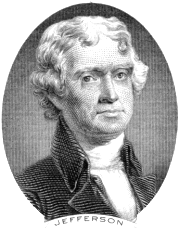Jefferson answered that "one who has seen both conditions of existence would pronounce" that too much law as among the civilized Europeans submits man to the greatest evil: "and that the sheep are happier of themselves, than under the care of wolves." It is because large societies cannot exist without government, said Jefferson, that the Native societies "break themselves into small ones."
What I believe Jefferson was noticing is the North American Indian tradition of liberty: a truly free way of life, without monarchs or despotic leaders who could dictate their will. Such societies were regulated from within; not by written laws, but a code of honor, respect, honesty, and an abiding appreciation of the sacred web of life. The result was a sense of liberty in the beauty of a natural setting that is now difficult for many of us to comprehend let alone imagine being able to live as a way of life.


2 comments:
From what I've read, Jefferson was ambivalent about Indians at best. In one letter, he wondered whether the US would have to remove or eliminate them.
But this could be the basis for a good "what if?" story. Suppose he had a pang of conscience and decided not to send the Lewis and Clark expedition. Or suppose he decided that executing the Louisiana Purchase was beyond his constitutional power.
Result: The Indians would've had a decade or two to plan for the inevitable tide of Americans. Maybe Tecumseh would've been able to forge a confederacy strong enough to repel the invaders. Maybe Tippecanoe wouldn't have happened and the Americans would've been forced to leave the Ohio Valley.
Okay, you could write the story that way. A researcher finds a lost document in which Jefferson speculates on how things might have been different if he had made different choices. And maybe it has consequences for the present. Maybe Jefferson signed a secret treaty with the Indians that the courts decide is still valid.
Post a Comment